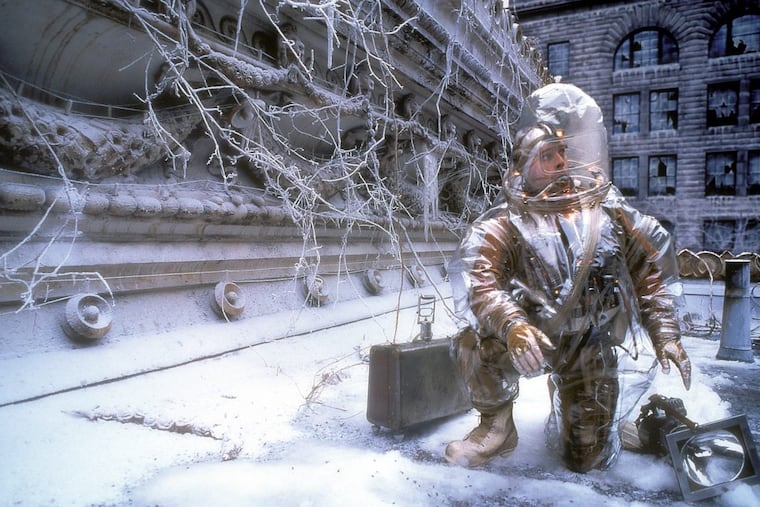All those mean quotes about Philadelphia? They're not true anymore | Opinion
Filmmaker Terry Gilliam, who chose Philadelphia to shoot the movie "12 Monkeys," told a reporter, "We went to Philadelphia looking for rotting America, It turned out to be the perfect place."

Many observers have commented on all the changes happening in Philadelphia: a new skyline, gentrification, endless events and festivals.
One change that has not been widely noted; Philadelphia is no longer the butt of endless jokes, nasty wise cracks, snarky quips, and insults.
For decades we were the national poster city for boring, backward, and bland. The image took a darker turn in the 1960s, when we went from bland to squalid and dangerous.
Examples from the early days: "I went to Philadelphia last week but it was closed." "Philadelphia: a well-lit cemetery." "I spent a year in Philadelphia; I think it was on a Sunday."
These jokes would fall flat with an audience today. Younger folks in particular would have no idea that Philly was once a synonym for dull.
About 60 years ago, humorist S.J.Perelman got this dig in: "Philadelphia, a metropolis sometimes known as The City of Brotherly Love, but more accurately as The City of Bleak November Afternoons."
Long-gone radio personality Fred Allen said, "I have a friend who takes a sleeping pill every morning, so people will think he's from Philadelphia."
An anonymous quip: "Philadelphia only seems dull because it's right next to exciting Camden." Clever, but a line that would get few yucks nowadays.
The wry, dry W.C. Fields, a native son, is remembered for his many put-downs of Philly. Yes, he jokingly said he wanted his tombstone to read, "On the whole, I would rather be in Philadelphia. "
In one film, Fields is on the gallows. The sheriff asks Fields if he has a last wish, and he replies, "Yes, I'd like to see Paris before I die. Philadelphia will do."
The alleged backwardness and blandness of our city grows from some kernels of truth. Way back in 1839, a Frenchman visiting the Quaker City wrote: "The first thing that strikes you when you arrive in Philadelphia is that it is Sunday. Everything is so quiet and there are so few people stirring."
In fact, Philadelphia was one of the last East Coast cities to rescind Sunday blue laws that once prohibited everything from baseball to liquor and car sales on the Sabbath.
Even today, without Sunday closing rules, it's hard to find food and drink in the wee hours on any night. In New York many diners are just being seated at 11 p.m. Here, restaurant employees are sweeping up by then.
But the sleepy, dull image gave way to perceptions that the city was decayed, depressing, or dangerous.
Terry Gilliam, who chose Philadelphia to shoot the movie Twelve Monkeys in 1995, told a reporter, "We went to Philadelphia looking for rotting America, It turned out to be the perfect place." In another interview, he said of the city, "I loved the feeling of sadness and melancholy."
City officials seemed so thrilled to have a Hollywood movie shot here that they obliged requests to make Philly seem even more like a rotting hulk, allowing rusting wrecked cars to be placed upside down next to City Hall.
The filmmaker David Lynch, who is famous for movies such as Eraserhead and The Elephant Man and the TV series Twin Peaks, also professes an odd love for a city he fondly called "a sick place." He says the five years he spent here as a student at the Pennsylvania Academy of the Fine Arts in the 1960s inspired much of his grotesquely sinister work. In a 1990 interview Lynch recalled feeling "a symphony of fear and industry and decay and distortions … but I was digging every moment of it and I wouldn't have given it up for anything."
The atmosphere was noted by sports stars of the time. Richie Allen, who started his career with the Phillies in the 1960s, left, and came back in the 1970s, once said, "I'll play first, third, left. I'll play anywhere except Philly."
Catcher and wit Bob Uecker played for the Phillies about the same time as Allen. He noted how boorish the fans were. "They work in the sewers for eight hours, then they come out to this sewer [Connie Mack Stadium] and all their emotions are expressed." He also said, "They would boo unwed mothers on Mother's Day." On Johnny Carson's show, Uecker once quipped, "A fan fell out of the upper stands [in Philly] and was booed."
Former Inquirer columnist Steve Lopez wrote many funny and satiric pieces about Philly and its politics, but he also wrote a dark book about drugs and violence, Third and Indiana, a fictional work rooted in reality.
Pete Dexter, a Daily News columnist in the late 1970s and 1980s, wrote a crime novel set in Philly, God's Pocket. Dexter, noted for his wit, wrote this memorable quote: "It took a long time to get used to Philadelphia. The weather, the traffic, the ground rules. I'd never seen a place where people were as rude to each other for no reason. Of course. I hadn't been to New York."
Today, the view that Philadelphia is rusting, dangerous, and dying is fading. The first impressions visitors experience these days are of a lively, pleasant city changing for the better.
In fact, if you Google "I love Philadelphia" or "Philadelphia Best City," there are an amazing number of positive stories, including from such national publications such as U.S. News and World Report. One story by a first-time visitor from New York carried this headline:
"I've Only Been in Philly for 4 Hours and I Already See Why People Love It."
Ron Avery is a writer in Philadelphia. avery1321@gmail.com